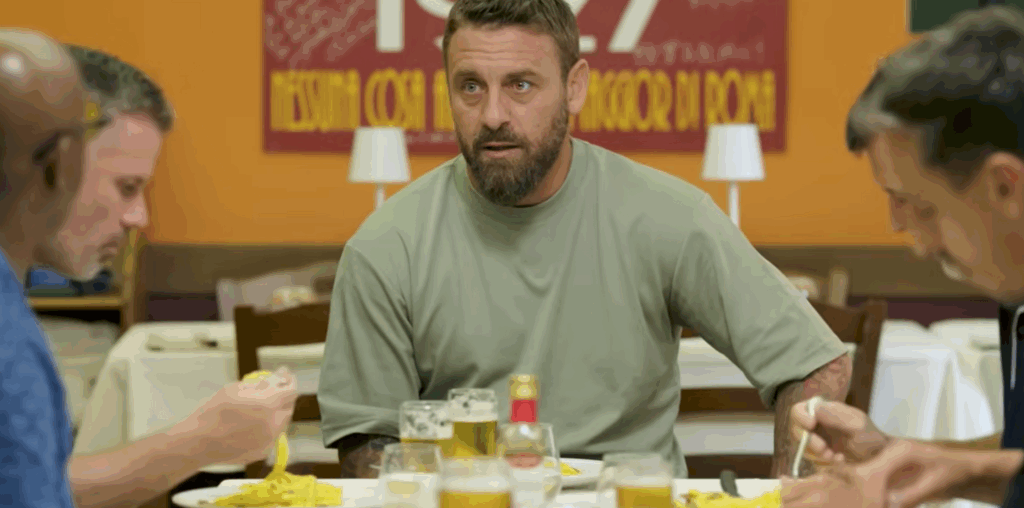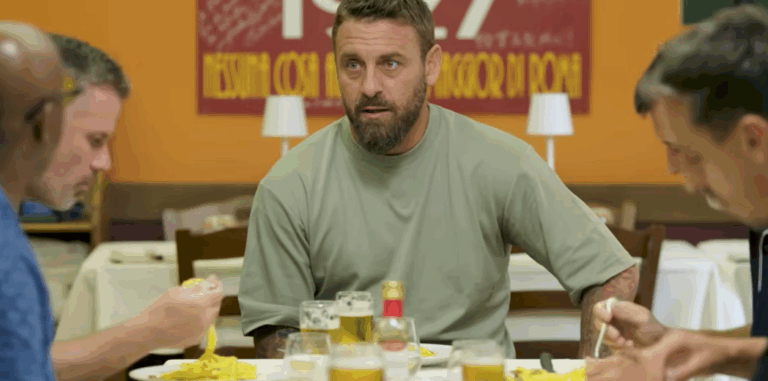In addition to dancing on Italy’s hit show “Sarabanda,” Tamara Pisnoli was once well-known as the stylish partner of football player Daniele De Rossi. Their relationship appeared to combine the glamour of Italian television with the charm of sports royalty. Many anticipated that they would continue to be a mainstay of Italy’s cultural elite after their May 2006 marriage. But the delusion started to fall apart, first subtly and then dramatically.
A full year prior to their formal marriage, in 2005, the couple’s daughter, Gaia, was born. For a while, they seemed to represent a new type of power couple: young, gorgeous, and ideally suited to the Italian media’s desire for gorgeous families. However, their split in early 2009 was a sign of something more serious. Initially, it appeared to be a typical separation between two individuals with dissimilar lives. In retrospect, De Rossi’s escape was well-timed, and he would go on to receive recognition for averting a serious personal catastrophe.
Daniele De Rossi’s Ex-Wife: Personal and Legal Profile
| Name | Tamara Pisnoli |
|---|---|
| Known As | Daniele De Rossi’s Ex-Wife |
| Date of Birth | Not Publicly Available |
| Marriage Duration | 2006 – 2009 |
| Children | Gaia De Rossi (born 2005) |
| Profession | Former Dancer (Sarabanda, Mediaset) |
| Legal Issues | Sentenced to 7 years and 2 months in prison |
| Father | Massimo Pisnoli (deceased, connected to organized crime) |
| Nationality | Italian |
| Height | 1.68 m |
| Public Profile | Wikipedia – Daniele De Rossi |

By 2014, Pisnoli had been arrested as a member of an eight-person group accused of kidnapping and assaulting a businessman, according to Italian news outlets. The reports presented a disturbing picture, which was especially startling considering her prior public persona. She went from being a well-known figure in the media to a convicted criminal after being sentenced to more than seven years in prison, which validated the worst suspicions.
For Pisnoli, this metamorphosis was not only personally devastating, but also culturally significant. It mirrored the common Italian story of public personalities plummeting, in a dramatic and conspicuous way. De Rossi’s handling of the fallout was especially noteworthy. He never took advantage of the circumstance to win sympathy. He had a very clear intention to change his personal life and raise his daughter, not to linger on the incident.
Pisnoli vanished from the cultural spotlight as De Rossi advanced through the ranks of the professional ranks, going from football player to coach and even taking over as manager of Roma. The quiet was telling. Eventually, her name was limited to court filings and sporadic Reddit posts. During her trial, her father’s past also came up again: Massimo Pisnoli was killed in 2008 in what was thought to be a mafia-connected execution. When combined with her personal legal issues, this background greatly increased public conjecture regarding the character of her relationships and way of life.
De Rossi’s story, meanwhile, took a positive turn. His story gained emotional depth in 2015 when he married British-Italian actress Sarah Felberbaum. Olivia Rose and Noah were born, expanding their family. Fans are especially drawn to the balance De Rossi now embodies—discipline, resiliency, and humility—all of which are developed without spectacle. Felberbaum frequently posts personal moments from their lives on social media. The contrast between his calm and Pisnoli’s demise is incredibly poetic.
The public took notice of this disparity. Posts such as “The hero who was destroyed by his wife 🇮🇹💔” went viral on fan forums and social media. The sentiment struck a chord despite being exaggerated. Instead of engaging in the celebrity drama, De Rossi rose quietly and tenaciously, seemingly driven by the very chaos that attempted to drag him down.
This story’s influence goes beyond football and entertainment. It illustrates a larger cultural propensity to romanticize celebrity partnerships only to revel in their breakdown. While De Rossi’s comeback became a ray of stability, particularly in the unstable world of celebrity, Pisnoli’s collapse became a symbolic warning about the consequences of unbridled ambition and associations.
Scandals involving powerful women, whether they be dancers, actresses, or models, have long captivated Italian culture. Despite having a well-known plot, Pisnoli’s tale ends without any atonement. Pisnoli’s identity stayed rooted in her fall, in contrast to individuals like Belen Rodriguez or Ilary Blasi, who rebranded themselves or resisted hardship. That fate was further solidified by her silence following sentencing.
The incident became a part of a more significant and extended metamorphosis for Daniele De Rossi. He made conscious decisions, such as moving to Boca Juniors prior to retirement or recently becoming a club owner with Ostiamare, his boyhood team, rather than letting the scandal mold him. These actions showed how intentional reinvention can be used to channel personal setbacks.
Even now, when his name is trending, it’s usually related to his ethics or leadership, not tabloid material. That is especially uncommon in a time when public vulnerability or scandal exploitation are frequently the foundation of personal branding. By making sure the past didn’t define him rather than erasing it, De Rossi was able to construct his image in a unique way.
Although Tamara Pisnoli’s sentence brought an end to one chapter, it also provided fresh insight into the connection between notoriety, responsibility, and individual preference. Despite being a warning, her story is not unique. It fits into a much larger discussion about how decisions made behind the scenes shape people’s personal lives, especially those of public figures.


